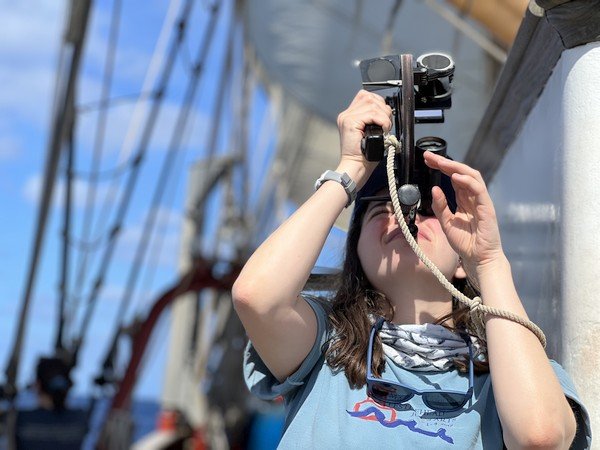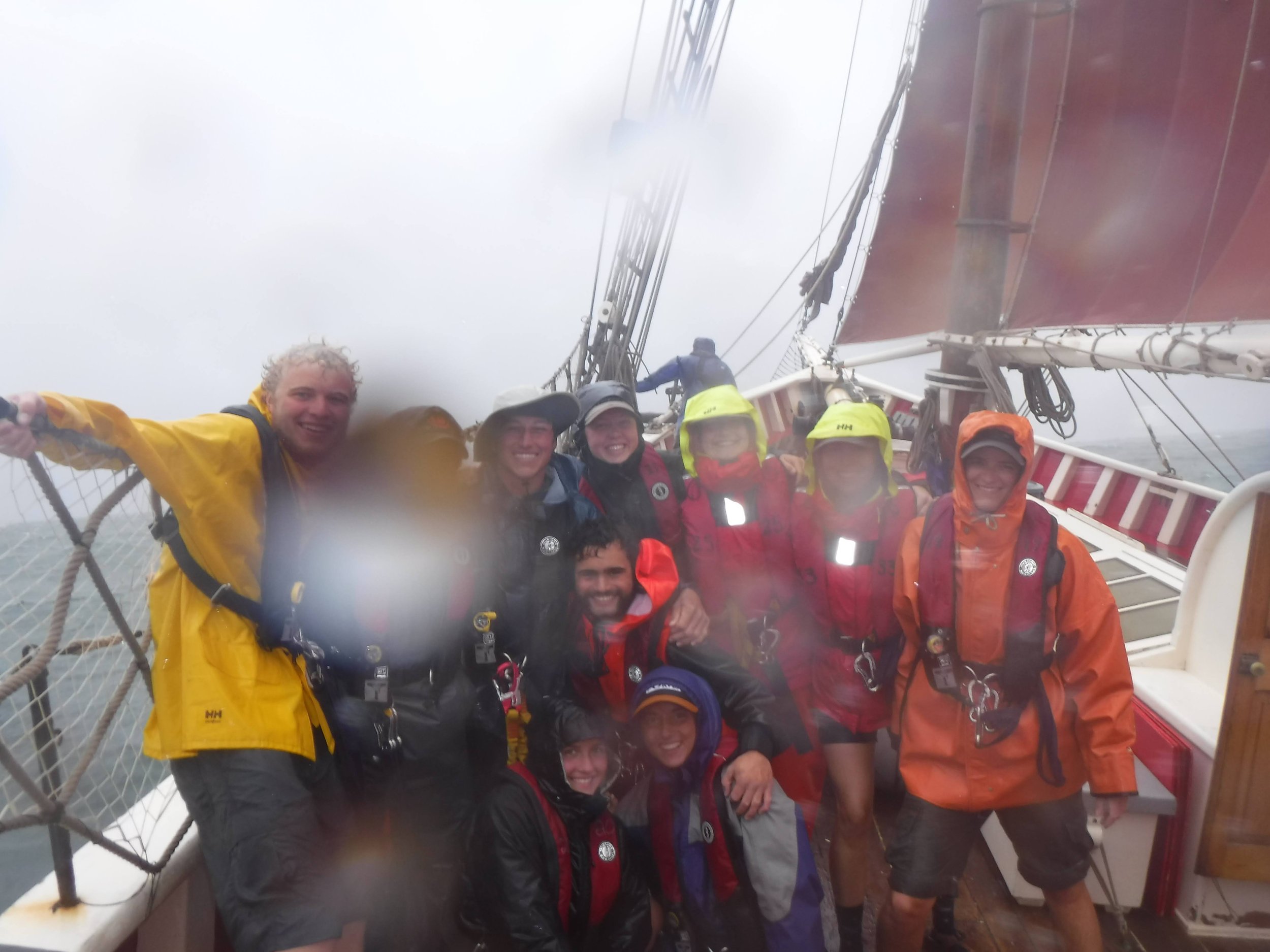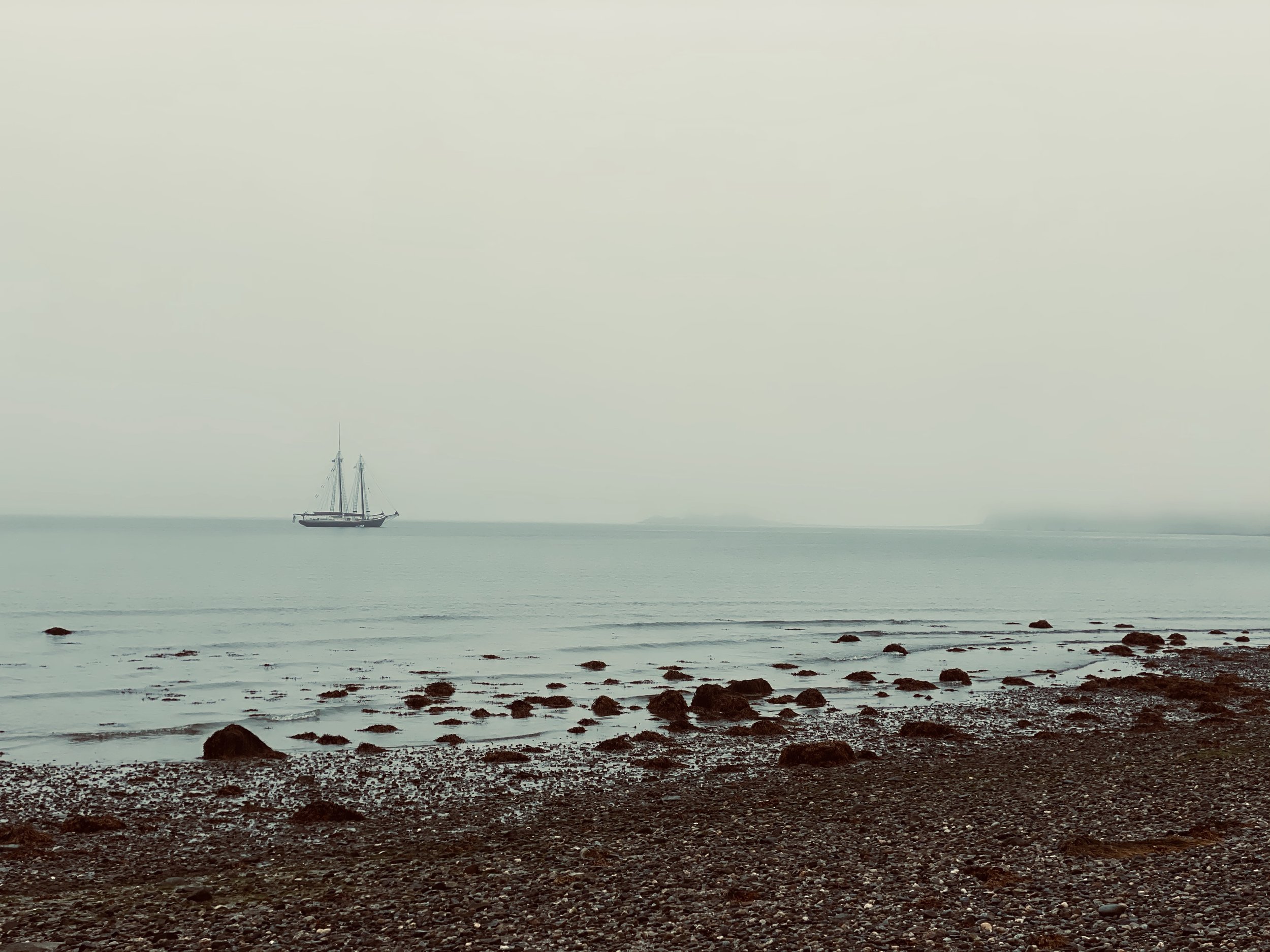My dream for the Planet School
In May 2022, I stepped off the SSV (Sailing School Vessel) Corwith Cramer after spending six weeks at sea as the 3rd Mate for “Marine Biodiversity & Conservation,” a college semester-at-sea program run by the Sea Education Association (SEA). Coming aboard in Key West, Florida seven weeks ago marked 14 years since I had stepped onto Cramer as a student myself. I had never been sailing before and I had no idea how profoundly that voyage would impact me. They say that the sea is a great teacher and I agree, but the community we intentionally create at sea deserves description too.
An isolated ship at sea is, in many ways, an ideal medium for creating deeply impactful learning opportunities. For this inaugural Planet School blog post, I want to share why I love to teach at sea and how the core elements of an ocean-based curriculum do not actually need to be unique to the sea at all. To do that, I need to give a bit of background on what it means to go sailing for a semester on a tall ship.
Removing the crutch of GPS and navigating with the stars is yet another opportunity for authentic student agency.
Make no mistake: sailing is hard work. I suspect that many students, like me when I was 20 years old, perceive a semester aboard a sailboat as one of relaxing exoticism bordering on luxuriousness: perfect sunsets, dolphins chasing the bow, strumming a guitar, reading Treasure Island or Moby Dick and coming home with a perfect tan and a year’s worth of Instagram posts — no filter, obviously. After all, yachts are a pastime of the wealthy and the Caribbean is a vacation destination. While there are innumerable moments of grandeur to be had at sea and all of the things I listed above usually happen multiple times on every voyage, they belie the full story. Any notion of #YachtLife is a delusion that gets shaken almost instantly.
Students step onto the ship and they step into a new world. First, the language is completely different — both the immense vocabulary of nautical terminology as well as the style of repeating commands. When you are given a task, you repeat the command back to the person who just gave it to you, then you go do the task, then once the task is done you return to the person who gave you the task and tell them it is complete, which they then repeat back to you. This creates a closed loop — there is little chance for miscommunication — but that much repetition does not come naturally. So not only do students have multiple subject areas to master — navigation, seamanship, meteorology, watch standing duties, laboratory procedures — but their way of communicating is being frequently corrected. They are studying new subjects in a new language in a place that is constantly moving (making many of them seasick) and with a watch-standing schedule that means their sleep is inconsistent. On all fronts, my semester with SEA in college was, hands down, my most challenging term and Brown University was not exactly a cake walk.
There is an unparalleled sense of accomplishment at braving a squall using the skills one has learned.
A Three Phase Approach
Every voyage program I have sailed on — SEA vessels and Proctor Academy’s Ocean Classroom semester — breaks their trip into three phases: The Spaghetti Phase, The Shadow Phase, and the Junior Watch Officer (JWO) Phase. The Spaghetti Phase is so named because, for the students, it feels like information is being thrown at them like spaghetti: some of it sticks and some (most) just falls to the deck. It could also be called the Firehose Phase because it can feel like drinking from a firehose. Whatever the metaphor, the first phase is characterized by feeling overwhelmed, adjusting to the boat, and being corrected frequently. It can be discouraging, so building unity within a student’s watch is important as is creating frequent moments for light hearted community building. The goal is for students to learn what to do and to see this behavior role-modeled by the staff.
The second phase (usually following two weeks of spaghetti) is when students start to shift to learning why things are done. During each watch, a student is selected to be the shadow and follow the mate through their duties. The mate narrates what they are doing as they do it, the student accompanies the mate when they check in with the captain, and the student starts to take the lead in various routines, like making sure the hourly boat checks and weather observations are completed. This is the chance to start peeking behind the curtain and feel invited to partake in the boat’s management.
Finally, the JWO Phase. In many ways, the entire trip builds to the JWO Phase. During this phase, a student is elevated to the position of Junior Watch Officer during their watch and takes over for the mate. Students interact directly with the captain to respond to weather changes, recommend sail evolutions, and delegate tasks within their watch. The JWO can even delegate tasks to the mate, so long as the task does not take the mate away from the quarterdeck for more than 10 minutes. While the mate is still the safety officer and legally responsible for the watch, they step back as much as possible. Mates are told to let mistakes happen and only yell “Hold!” if a student is about to injure someone or damage the boat. No reason is given for yelling “Hold!”, so action does not resume until the JWO or one of their watchmates discovers the problem and corrects it.
A JWO, wearing the “JWO Hat,” plotting the ship’s position.
A Recipe for Great Learning
This three phase progression is where the magic happens. All three phases are essential; neither is successful without the other two. Most conventional classrooms never make it past the Spaghetti Phase. Conversely, if we were to skip the Spaghetti Phase, the students would not feel prepared for the greater responsibility asked of them. This progression works because of the learning environment that is very intentionally created by the staff, both in the program’s core design and through staff meetings that happen underway. That environment consists of a few essential ingredients:
Authenticity. If students feel that their input and time is valued as part of an experience that is not “busy work,” they will invest in it. Since the boat is a real boat sailing on the ocean, everything connected to that objective being completed successfully is very clearly not busy work. There are very real consequences to not doing a job completely or correctly. This element drives home the value of “Seek Excellence.”
Relevance. A student could be assigned the authentic task of digging a big hole or meticulously cleaning the interior components of an antique pocket watch but will probably lose interest if the question “why” is not answered. This can sometimes happen with boat checks, which happen every hour on a boat and begin to take on an element of blind routine if their value is not reinforced. When it comes to establishing relevance, the connection can be specific to the student, broad to society, temporal to the moment at hand, or tied to the legacy of the human race 10,000 years from now, but there must be an answer.
Ownership. Of all the characteristics here, this is the one we see the most frequently in existing classrooms. High school students are given charge of completing their assignments, showing up to class on time, and discharging a multitude of duties. What I advocate for here is that we create more pathways for the sphere of ownership to keep expanding. We should reward great performance with greater ownership.
Agency. This is different from ownership, perhaps even a step up from ownership. Agency combines ownership, relevance, and authenticity to create a moments where the student makes choices that have consequences. As a mate, when I delegate setting a sail to a student, I have given them ownership of that task. Often, the ownership of something means following a script for how that job needs to be done: there is a right way to set a sail and a myriad of wrong ways. Agency means writing the script.
Ability to Fail. It is possible to create a learning environment where all of the above are present and yet the lesson still falls short on this final element. A JWO will feel authenticity, relevance, ownership, and agency by the nature of being JWO, but if the mate steps in to answer a tough question or offers an overly revealing hint, the ability to fail dissolves. In some ways, ability to fail creates a deeper layer of fusion between authenticity and the relevance of the experience that generate moments of genuine discomfort for students.
As a mate, a critical element in creating a successful JWO Phase is to step back and let the student make mistakes, or forget things, or become overwhelmed. This can be hard because I want my students to succeed, but I have come to appreciate that there needs to be a “butterfly emerging from the chrysalis” moment if the value of everything that happened up to that point is going to matter. A student can watch and study something a million times, but then it is their turn to step up and do it. Near the end of the novel The Alchemist, the alchemist describes this concept to the protagonist:
“What you still need to know is this: before a dream is realized, the Soul of the World tests everything that was learned along the way. It does this not because it is evil, but so that we can, in addition to realizing our dreams, master the lessons we’ve learned as we’ve moved toward that dream. That’s the point at which, as we say in the language of the desert, one ‘dies of thirst just when the palm trees have appeared on the horizon.’Every search begins with beginner’s luck. And every search ends with the victor’s being severely tested.”
To be clear, I am not talking about fear of failing as a person. Our classrooms already have this trait to a damaging degree with our modern grading system and the pressure of college admissions. I have frequently seen tears on JWO and while sometimes that is just how a person processes stress, there needs to be a calibration of duties with what a student is ready for, which varies by person. When I debrief with my JWO after the watch is over, a pointer I frequently remind them of is to not be too hard on themself when they fail: accept that you will make a mistake, take a moment to reflect on it, and then give yourself the grace to move past it and you can unpack the lesson later. As a leader, you must move past it or you will be distracted from your job in that moment. I also believe that a student needs, ideally, a minimum of three shifts as JWO to enable them to witness their own progress and internalize lessons. Most often, a student’s first JWO stint is not pretty and having that be their one shot would be unfortunate.
Beyond Sailing
Sailing for weeks at a time is an amazing adventure that makes creating many of these conditions easier, but in some ways it is not ideal. The sleep schedule, seasickness, and risk of burnout for staff and students are the most obvious downsides. Sailing is also an expensive and exclusive opportunity. And do we really need a boat in order to do any of this?
Absolutely not.
My goal with the Planet School is to take this process that I have seen be so effective on sailboats and replicate it in other realms. A three phase progression carried out between a knowledgeable practitioner and a group of students can be done in almost any field: the leader of a “watch” need not be a professional mariner. The expert could be a farmer, an engineer, an economist, or an artist. The task need not be sailing, it could be starting a business, managing a farm, or building a yurt. It could even be building a school.
The underlying project of the Planet School is to build the school itself. Since a campus is a community, such an undertaking could reasonably include a project in almost any discipline, giving students the chance to explore their passions and be exposed to potential passions they have not experienced before. Some of my most potent memories from high school are from the activities that included role-playing of “real life”: speech and debate, theatre, Model UN, Youth Legislature, and the school newspaper. Through the prevalence of internships, externships, and youth employment as well as the cliche of how teenagers yearn to leave home, the desire for real world experience at that age is evident. We should build our schools to be authentic laboratories for trying out real world solutions. If we are to be better stewards of our planet, then we need to do more than encourage experimentation, bold thinking, and sustainability — we need to create education spaces where we actively train youth in those habits.
I never imagined myself as a teacher. I never imagined myself working in education. Yet I have learned that any systemic reimagining of human civilization must begin with how we equip our future generations. My vision for school is that, whatever the project, students are challenged in an authentic, relevant way where they have agency, feel ownership, and are trusted to be able to fail.



